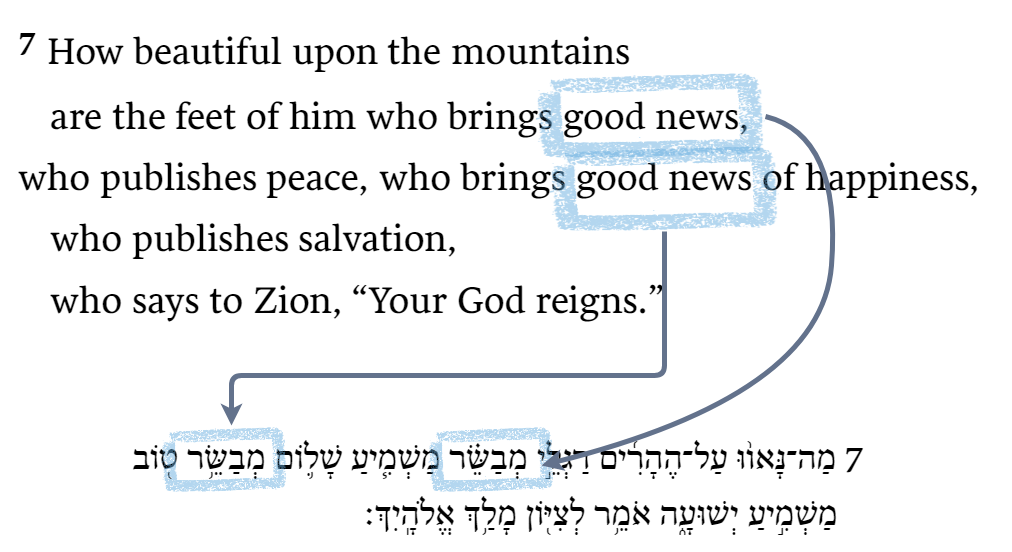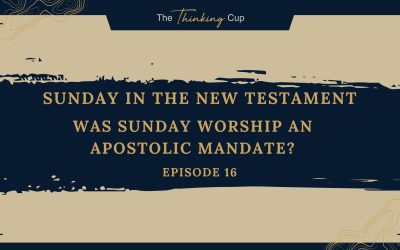Most understand that the Greek word for ‘Gospel’ (εὐαγγέλιον) is euangelion, which means ‘good news.’ I’ve been told many times that this is where we get the English idea of evangelism; whether that is true or not, I’m not certain. If we trace the Hebrew equivalent using the Septuagint, the Greek translation of the Hebrew, we find the word transliterated beśō·rā(h) (מְבַשֵּׂ֗ר), and this word in Hebrew has a very specific meaning.
As we move through this study, I have found that many people don’t wish to understand the real meaning of the Gospel. I’m not sure if that is because they have preconceived ideas, notions that they are steeped in. Biases they can’t break from… Or maybe it’s an author or modern prophet/tess that has put a veil over their understanding of the simple meaning of the word ‘Gospel.’
In Isaiah 52, if you do an exegetical study of Isaiah 52 and 53 you will find this Hebrew word for ‘gospel’ has a very specific meaning.
Let’s take a look at Isaiah 52:7,

I’ve placed the Hebrew text below and don’t forget that Hebrew reads right to left. This very specific Hebrew word, מְבַשֵּׂ֗ר, is a word that most of Adventism doesn’t understand. The phrase ‘who publishes peace,’ is a characterization that describes what came before, the ‘feet of him who brings good news.’ The same is true with the second occurrence of מְבַשֵּׂ֗ר in the text. The one ‘who brings good news of happiness,’ provides salvation and proclaims that Yahweh reigns. These are the clear and reassuring meanings of the word מְבַשֵּׂ֗ר.
Here, Isaiah states a basic concept in Hebrew: Good News brings peace, happiness, and salvation and proclaims Yahweh reigns! How beautiful upon the mountain are the feet of him who announces beśō·rā(h). Who brings incredibly great news of salvation. It’s important to understand that beśō·rā(h) (מְבַשֵּׂ֗ר). Beśō·rā(h) is a military term that comes from the battlefield. It was the cry of the messenger who ran from the field of battle to announce to the city the King’s victory. As the runner approached the city, he began to shout loudly, “beśō·rā(h), beśō·rā(h), beśō·rā(h).” His shout would echo from the nearby mountains and on the walls of the city so that those who were watching and listening would then shout to the people who were dying of hunger and thirst inside the city! They should echo the shout, “beśō·rā(h), beśō·rā(h),” and the loud cry meant the KING had destroyed the enemy. The King was victorious! The King has won the victory. The battle was won; it was a done deal!
If we head over to Psalm 24, we will see what happens when the King arrives at the city, and the soldiers that were with the King would shout to the soldiers inside the city,
Psalm 24:7–10 (ESV)
7 Lift up your heads, O gates!
And be lifted up, O ancient doors,
that the King of glory may come in.
8 Who is this King of glory?
The Lord, strong and mighty,
the Lord, mighty in battle!
9 Lift up your heads, O gates!
And lift them up, O ancient doors,
that the King of glory may come in.
10 Who is this King of glory?
The Lord of hosts,
he is the King of glory! Selah
What does it mean in the text to be the ‘King of Glory?’ What is glory in this context? Glory, kā·ḇôḏ in Hebrew, can have several different contextual meanings. Glory here signifies to the reader that this King has earned a high state of credibility because of the battle that was won. The bounty that was gained deserves high praise and glory. Who is this King of Glory? The Lord of hosts is the King of Glory, and so “beśō·rā(h)” was an announcement of the victory that has already been accomplished. Beśō·rā(h) was not an announcement of something that would happen but rather something that had already taken place.
In ancient Hebrew times, the King would ask his soldiers to inscribe on a huge upright stone, called a stele, how the king had won the victory. We see this entire concept playing out in the writings of Isaiah chapter 53. Chapter 52 is the Good News being announced and proclaimed. The watchmen lift up their voices together to shout for joy when the Lord returns to Zion victorious.
The stele monument to the King’s victory is found in Isaiah 53, which is why the prophet writes it in the past tense. Isaiah 53 is a well-known Messianic prophecy, but it’s written in the past tense, as Isaiah describes how the King won the victory. The Messiah taking sin on himself, taking our pain, our suffering. He is pierced for our transgressions. He is crushed for our iniquities. It’s by his wounds we are healed.
“All we like sheep have gone astray; we have turned—everyone—to his own way; and the Lord has laid on him the iniquity of us all.” (Is 53:6)
The Gospel has NO OTHER MEANING in scripture other than the victory of Jesus on our behalf, having taken on our sin and given us the goods, the Bounty of His Grace, of His righteousness. It’s a DONE DEAL. It has been done. It’s already accomplished. The victory is won! There is NO OTHER MEANING to the word Gospel.
You cannot say the Gospel of the Three Angels Messages or the Gospel of His Second Coming or a Special Gospel to give to the world in these final days.
If you tie the concept of the Gospel with an event that hasn’t yet happened, then it is NO GOSPEL AT ALL!




0 Comments